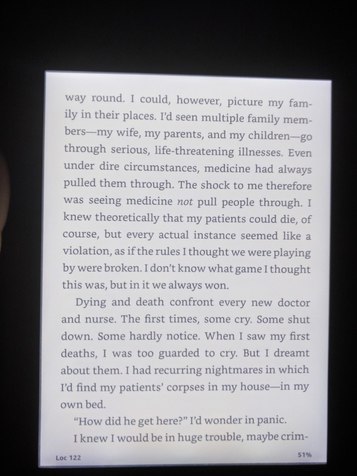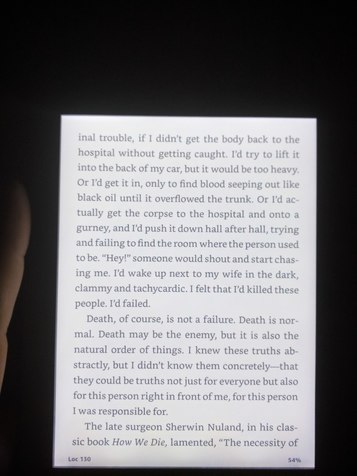-
 Shawn
13.5kI have a book I am looking through, though not too intently reading that grabbed my attention. The book is Being Mortal by Atul Gawande.
Shawn
13.5kI have a book I am looking through, though not too intently reading that grabbed my attention. The book is Being Mortal by Atul Gawande.
Here is what I wanted to discuss:


The reason I post this is that it seems to me that the most honorable profession one can have is being a doctor or surgeon. An immense amount of responsibility is placed on you to ensure that your patient gets better and that one has done everything in one's power to ensure that. But, nowadays some doctors are actively trying to hasten death through assisted suicide. How do they do it? My father was a dentist that only worked 15 years of his life, burned out, and moved to another country where the dollar goes further and invested his money there. He never told me he hated his job; but, my mother attests otherwise. Dentistry used to have the highest suicide rates per profession, now veterinarians have claimed that spot.
I can't imagine working on someone who is petrified of pain and you have to calm him or her down. Now, extend this concept to surgery and I'm totally unable to fathom how can someone practice such a profession for prolonged periods of time. It's my assumption that the people who do it for the money end up the most miserable and unhappy of the lot. There has to be a calling to practice professions with high amounts of burnout rates, or even suicide rates.
So, what are your thoughts about people in the medical field? Are they practicing a noble profession or is it just another job? -
 BC
14.2kAre they practicing a noble profession or is it just another job? — Wallows
BC
14.2kAre they practicing a noble profession or is it just another job? — Wallows
It's an elite profession requiring successive successful leaps over significant hurdles. Becoming a doctor is expensive, very time consuming, and difficult (in a variety of ways). The rewards vary from modest to excessive. Most people, irrespective of their noble intentions, can not afford to become doctors.
If you take a big-picture view of progress it isn't medicine and surgery that have brought about the greatest gains in quality of life. What has made the most difference in quality of life is the work of farmers and civil engineering. More and better food and effective sanitation systems have accomplished much of the benefit we enjoy. If you think wonder drugs are important, that credit goes to chemists and research scientists, not doctors.
Doctors can not claim most of the credit for gains in longevity. Most people still die of cancer, heart disease, and stroke. Engineering has significantly reduced the likelihood of dying in auto accidents, though a determined human can overcome those advances with either alcohol or a cell phone. Greater prosperity gives many more people access to adequate diet, shelter, clean water, and education. All of contributes to health and longevity.
So, no: medicine is not an inherently noble profession, but some doctors are noble. Medicine is a technical field. Most doctors are careerists who do at least reasonably good work and are quite well rewarded.
What doctors can do is often relieve suffering and improve healing. Their capacity to perform those beneficences owe much to people who are not doctors. -
 Jake
1.4kMy college roommate went on to Harvard Med School and became a surgeon. The whole process is an incredible amount of round the clock work that goes on for years and years. I'm amazed that anyone is willing to do it.
Jake
1.4kMy college roommate went on to Harvard Med School and became a surgeon. The whole process is an incredible amount of round the clock work that goes on for years and years. I'm amazed that anyone is willing to do it.
But, some people are just born for it, just as folks like us were born to philosophize. I knew my roommate from about age 10, even as a child he was constantly taking things apart and putting them back together.
What interests me about medicine is that these are highly scientific people generally, whose profession is built upon blind faith to a significant degree.
I'm looking forward to the day some doctor says to me, "If you don't get this operation you're going to die, so obviously you'd better do what I say." I'm going to turn to the doctor, especially if they're kind of snotty and superior, and will ask...
Please show me the scientific evidence that life is better than death.
This was my roommate. He is obviously a very highly skilled mechanic, but the question I've just asked would baffle him. He would consider it silly and ridiculous, because his mind was not born to challenge the group consensus.
Which is probably just as well... -
TheMadFool
13.8kSo, what are your thoughts about people in the medical field? Are they practicing a noble profession or is it just another job? — Wallows
I don’t know. I call it a fortunate coincidence. You make money and save lives.
I guess most doctors are in it for the money and not any ethical considerations.
They say the medical profession has the highest rates of suicide. It doesn’t seem like a happy job although those who do take their own lives probably didn’t see the “fortunate coincidence” I referred to above.
Also at what stage of becoming or being a doctor do the suicides occur? If it’s during the training phase then it means it’s not as bad as the statistics show. Being a doctor may be a happier thing than becoming one.
On the whole I’d say it’s a great profession - noble and loads of monetary benefits.
There may be bad doctors out there though. There’s always a rotten apple in the bunch you know.
How about teachers? Isn’t it better to be a teacher, mounding children into great roles in society? -
 andrewk
2.1k
andrewk
2.1k
Really? More honorable than a commercial airline pilot that holds the lives of up to 500 people in her hands as she brings a plane in to land? More honorable than the biologist that develops a new antibiotic for resistant bacteria, that will save millions of lives? More honorable than the politician that puts their career on the line to try to abolish slavery. More honorable than the engineer that ensures that the bridge that has several hundred people crossing it at any point in time will not collapse? More honorable than the the police officer that puts her life on the line to stop a white supremacist that is driving their car into people near a mosque?The reason I post this is that it seems to me that the most honorable profession one can have is being a doctor or surgeon. — Wallows
Being a doctor is a great job, and a very rewarding profession. It is also very handsomely rewarded. Some doctors are very caring. Some are not at all. And notwithstanding the many TV shows and movies about it, it is not more important than many other professions, nor does it have more lives depending on it. -
 Arkady
768
Arkady
768
This is painting with a very broad brush. Doctors' professional lives and compensation vary greatly depending upon where they work, which field of medicine they work in, their patient population, and myriad other factors (never mind the usual stressors which go along with nearly any job). And practicing medicine comes with wrangling with insurance companies, and paperwork, paperwork, and more paperwork, which is hardly a gratifying task for most people.Being a doctor is a great job, and a very rewarding profession. — andrewk -
 BC
14.2kThey say the medical profession has the highest rates of suicide. — TheMadFool
BC
14.2kThey say the medical profession has the highest rates of suicide. — TheMadFool
Several professions claim to have the highest rate of suicide; it's a contest, I guess. But how do we identify and count all these suicides? From obituaries? From life insurance companies? From anecdotal reports? From police reports? What?
What is the cause for all these suicides? Is it the gap between ideals and reality? Financial pressures? Something inherent in highly ambitious people? Maybe they are insufficiently prepared to deal with life's ingravescent inimicalities? I don't know.
I doubt that doctors are especially prone to suicide. As how to doctors do it... they should know more than anybody else how to do it -- and they have the means at hand -- drugs, sharp objects, etc. -
 Relativist
3.6kI don't know that it's an honorable profession, but it does seem to be one sort of profession that a truly honorable person might take. I suspect some people become doctors from an initial noble intent, but based on my personal experience - this nobility often disappears. My personal physician (internal medicine) seems drawn to it by the intellectual challenge of diagnosing. There's nothing wrong with that - in fact, it's similar to my being drawn to software engineering and support, but it's not "noble" per se.
Relativist
3.6kI don't know that it's an honorable profession, but it does seem to be one sort of profession that a truly honorable person might take. I suspect some people become doctors from an initial noble intent, but based on my personal experience - this nobility often disappears. My personal physician (internal medicine) seems drawn to it by the intellectual challenge of diagnosing. There's nothing wrong with that - in fact, it's similar to my being drawn to software engineering and support, but it's not "noble" per se.
Remember Dr. Kevorkian? Regardless of whether you agree with what he did, it seems to me he was driven (at least partly) by noble intent. Doctors who spend a lot of time on charity cases seem driven by noble intent. But most of the ones we run across are just doing their job. -
TheMadFool
13.8kYou're right. The higher suicide rates may be related to knowledge of how to commit suicide and easy access to methods.
Welcome to The Philosophy Forum!
Get involved in philosophical discussions about knowledge, truth, language, consciousness, science, politics, religion, logic and mathematics, art, history, and lots more. No ads, no clutter, and very little agreement — just fascinating conversations.
Categories
- Guest category
- Phil. Writing Challenge - June 2025
- The Lounge
- General Philosophy
- Metaphysics & Epistemology
- Philosophy of Mind
- Ethics
- Political Philosophy
- Philosophy of Art
- Logic & Philosophy of Mathematics
- Philosophy of Religion
- Philosophy of Science
- Philosophy of Language
- Interesting Stuff
- Politics and Current Affairs
- Humanities and Social Sciences
- Science and Technology
- Non-English Discussion
- German Discussion
- Spanish Discussion
- Learning Centre
- Resources
- Books and Papers
- Reading groups
- Questions
- Guest Speakers
- David Pearce
- Massimo Pigliucci
- Debates
- Debate Proposals
- Debate Discussion
- Feedback
- Article submissions
- About TPF
- Help
More Discussions
- Other sites we like
- Social media
- Terms of Service
- Sign In
- Created with PlushForums
- © 2026 The Philosophy Forum








